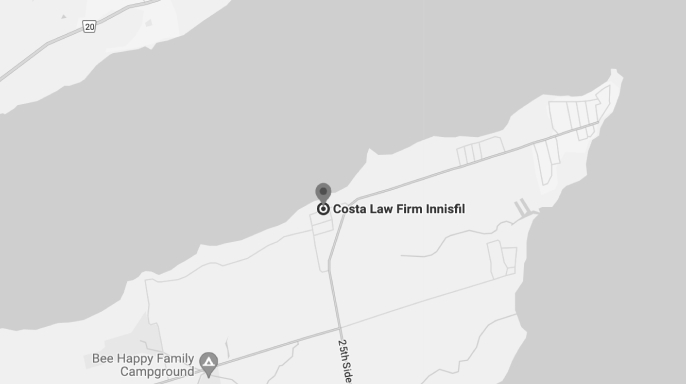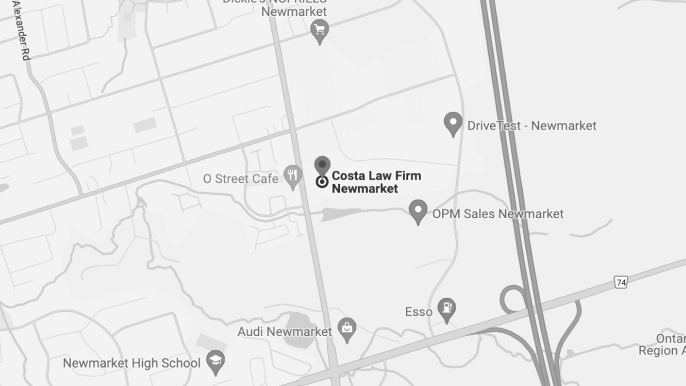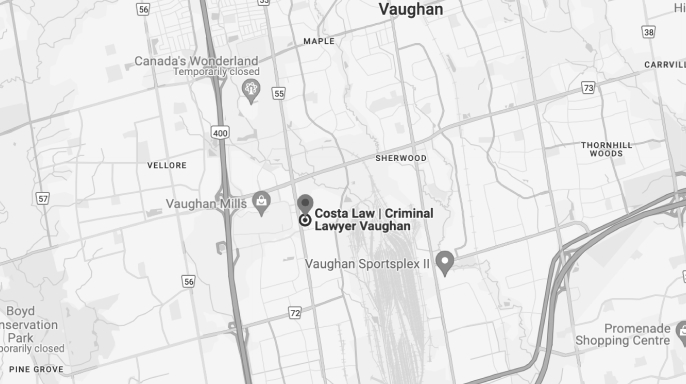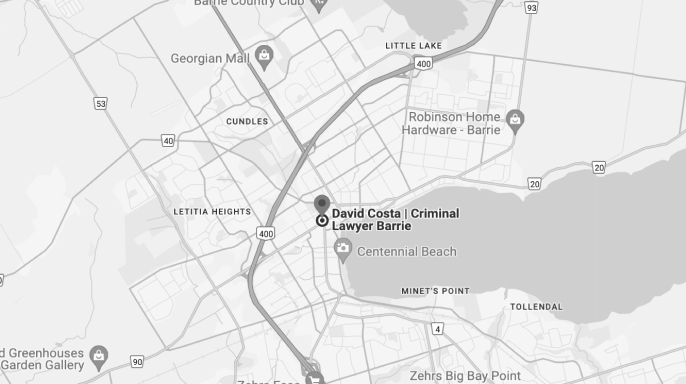Aggravated Assault Charge Lawyer Toronto
Of all assault charges, aggravated assault is the most serious. Whether you are accused of a threat or the actual act of assault, facing such charges can result in severe penalties upon conviction. At Costa Law, we understand that the most important element of an assault charge lies in the intent to cause harm without the victim’s consent, irrespective of whether a physical injury occurred. Therefore, we are ready to defend you and ensure you obtain a favourable outcome.
We are a reputable law firm that specializes in defending assault cases with an unwavering commitment to achieving favourable outcomes for our clients. Indeed, we understand the gravity of aggravated assault charges and the immense stress and uncertainty the accused endures during such trying times. You can count on us for legal representation and support.

Understanding Aggravated Assault
S.265 of the Canadian Criminal Code broadly defines a simple assault. It is the intentional force application, whether directly or indirectly, to the complainant without their consent. According to S.268 of the Criminal Code, a common assault becomes aggravated when the alleged offender wounds, maims, disfigures or endangers the victim’s life. Unlike other assault charges, there must be a severe injury or substantial risk of injury.
Defining ‘Aggravated Assault’
In all assault cases, the presence of aggravating elements significantly heightens the severity of the allegations. For any alleged assault to fall within the definition of aggravated assault, the alleged offender must have committed it intentionally, and their action maims, disfigures, or endangers the alleged victim’s life.
To effectively define aggravated assault, the Crown prosecutor must prove the key elements of this offence. These aggravating elements include:
The Intentional Application of Force
For an assault to be classified as aggravated, it must meet stringent criteria. First, the application of force must be purposeful and executed with the explicit intention of causing harm. This force can manifest either directly or indirectly. This extends to scenarios where force is applied through a third party or intermediary.
Also, the intentional application of force means that the accused clearly understands that such action could result in severe bodily harm to the victim. This intentional use of force serves as a pivotal element proving an aggravated assault occurred.
‘Force Applied Directly or Indirectly’
The application of force in aggravated assault cases can take different forms. It can be administered directly or indirectly – through intermediary means. This flexibility in the method of force application underscores the gravity of the offence, as it extends the scope of liability to cover not only direct physical actions but also those facilitated by secondary means.
‘Force Applied to a Person’
Central to the definition of aggravated assault is the requirement that the force must be directed toward a person. This excludes instances of accidental or unintended actions. This element reinforces the intentional nature of the offence and emphasizes the deliberate targeting of an individual as the victim of the assault.
No Consent
Further, the absence of consent from the victim serves as a fundamental distinction between aggravated assault and other forms of physical interaction. Unlike scenarios where consent may mitigate the severity of the charge, aggravated assault unequivocally disregards any notion of consent. Remember, a person can consent to simple fights but not aggravated assault.

Summary Conviction or Indictable Offence?
Unlike other forms of assault, the nature of bodily harm to the victim is of such degree that it maims, disfigures or endangers the complainant’s life. Thus, the severity of bodily harm is more than just minor injuries. Some of the common injuries involving maiming, wounding, or disfigurement associated with aggravated assault include a broken orbital bone, broken jaw, any significant cutting of the skin, and more.
Note that the Criminal Code highlights three levels of assault, excluding sexual assault. These levels include:
- Simple or common assault
- Assault causing bodily harm
- Aggravated assault
Under section 265 of the Criminal Code, common assault is the least serious, followed by assault causing bodily harm. Aggravated assault is the most serious form of assault. Both simple and assault causing bodily harm are hybrid offences.
That means the prosecutor can either proceed by summary conviction or indictment, depending on the severity of the crime. However, aggravated assault is an indictable offence punishable under the Criminal Code. Hence, no summary conviction.
Burden of Proof in Aggravated Assault Cases
If you are charged with aggravated assault, the burden of proof rests squarely on the shoulders of the prosecution, specifically the Crown. To secure a conviction, the Crown must establish several crucial elements beyond a reasonable doubt, thereby affirming the guilt of the accused individual. These elements include:
Date, Time and Jurisdiction where the Crime Happened
The Crown must provide irrefutable evidence regarding the date, time, and jurisdiction of the alleged offence. Establishing these foundational aspects serves as a preliminary step in the prosecution’s case and lays the groundwork for subsequent legal proceedings. Typically, confirming these details is relatively straightforward for the prosecution and forms the initial stage of the evidentiary process.
The Identity of the Accused
Following the establishment of the temporal and spatial context of the offence, the prosecution must prove the identity of the accused as the perpetrator of the act committed. This entails presenting compelling evidence that unequivocally links the accused individual to the criminal offence. This can be done through eyewitness testimony, forensic evidence, or corroborating documentation.
The Elements of Aggravated Assault
Once the foundational elements of the case are firmly established, the Crown must then focus on proving each constituent element of the violent crimes of aggravated assault beyond any reasonable doubt.
Thus, the prosecutor must demonstrate that the accused intentionally applied force to the victim without their consent. This requires providing evidence that unequivocally establishes the deliberate nature of the force exerted, whether through direct physical actions, such as punching, or indirect means, such as hurling objects at the victim.
The prosecution must also establish that the application of force was executed to cause bodily harm, thereby leading to the aggravated injuries suffered by the victim. This necessitates proving that the accused had the requisite mens rea or guilty mind. That means the defendant must have foreseen objectively that their action (assault) could cause severe bodily harm to the victim.
Sure, the Crown is not obligated to prove that the offender specifically intended to inflict the precise injuries sustained by the victim. However, it must be proven beyond reasonable doubt that such injuries were reasonably predictable outcomes of the assailant’s actions.
To assess the intent of the accused, the court applies the “reasonable person” test. This helps to determine whether a hypothetical reasonable individual in similar circumstances would recognize the foreseeable risk of bodily harm inherent in the defendant’s conduct. This standard ensures a consistent and objective approach to determining ‘the guilty mind’ in aggravated assault cases.
The Role of Our Criminal Defence Lawyer
If you are accused of an assault causing bodily harm, sexual assault, or aggravated assault, it’s in your best interest to hire an experienced lawyer. Minor forms of assault are considered summary conviction offences with lighter maximum sentences. However, aggravated assault is an indictable offence that carries a sentence exceeding fourteen years upon conviction. Depending on the severity of the crime and the resulting bodily harm, the offender could face life imprisonment.
Considering the harsh penalties associated with an aggravated assault conviction, it’s best to consult our lawyers at Costa Law. We will undertake a rigorous assessment of the evidence presented by the prosecution. All our lawyers have a keen eye for detail and a wealth of legal proficiency. We will analyze the foundational elements established by the Crown, including the date, time, and jurisdiction of the alleged offence, as well as the identification of the accused individual.
Indeed, we will draw upon our extensive experience in criminal defence to create a solid defence strategy tailored to the unique circumstances of your case. Central to our approach is the development of compelling arguments aimed at challenging the prosecution’s arguments. We can successfully cast doubt on their proof of each element of the offence.
Additionally, our lawyers understand the critical importance of addressing the core elements of aggravated assault charges, particularly the assertion of intent and the foreseeability of bodily harm. We leverage our in-depth understanding of legal principles and precedents to analyze the prosecution’s case. This way, we can identify potential weaknesses and inconsistencies that could undermine their arguments. Such information will strengthen our defence strategy.
At Costa Law, our commitment to excellence extends beyond mere legal representation. It encompasses a steadfast dedication to protecting the interests and well-being of our clients. By trusting us to defend you and protect your rights, you can rest assured that we have experienced lawyers who are tirelessly advocating for your rights and pursuing the most favourable resolution possible.
Penalties for Aggravated Assault
According to the Criminal Code, not all sentencing dispositions are available for this straight indictable offence. For instance, someone found guilty of aggravated assault can’t get a discharge like someone convicted of a simple assault.
Just like a conviction of assault causing bodily harm, aggravated sexual assault, or assault with a weapon, a person convicted of aggravated assault will face harsher sentences. However, an individual convicted of aggravated assault may get probation and a suspended sentence. Furthermore, there’s no minimum punishment required upon conviction of this crime.
Considering aggravated assault is an indictable offence that carries a maximum prison sentence of 14 years, the defendant is entitled to a preliminary hearing. Remember, this maximum penalty can increase to a life sentence if the crime involved intimate partner violence and the person convicted has a domestic violence conviction.
Sentencing Considerations
In the Canadian criminal justice system, sentencing for aggravated assault cases is a complex process that takes into account various factors to ensure a fair and just outcome. Judges tasked with sentencing offenders must first determine the applicable sentencing principles before weighing the aggravating and mitigating factors specific to each case.
An important consideration is the presence of aggravating factors that exacerbate the severity of the offence. These factors may include the offender’s prior criminal record, particularly if it contains entries for violent offences. Such convictions may signal a pattern of behaviour that poses a threat to public safety.
Additionally, the nature and severity of the injuries inflicted upon the victim play a crucial role. That’s why an aggravated assault that causes permanent or life-altering injuries requires greater judicial scrutiny.
Further, the circumstances surrounding the assault are carefully evaluated. The judge or jury will assess whether the assault was an unprovoked attack. The motivations behind the assault and any evidence suggesting the use of violence while committing other criminal offences, such as sexual assault, are also taken into account. These factors collectively contribute to the determination of an appropriate sentence that reflects the gravity of the offence and promotes the principles of deterrence and accountability.
The judge or jury will also consider mitigating factors that may necessitate leniency or alternative forms of punishment. This includes taking into account the offender’s personal circumstances and prospects for rehabilitation. This approach underscores the justice system’s recognition of the potential for positive change and reintegration into society.
It is important to note that in cases where there is a conviction for aggravated assault, prison time is a likely outcome. This is due to the seriousness of the offence and the need to protect public safety.
Sure, alternative sentencing options such as probation or community service may be considered in certain circumstances. However, the imposition of a custodial sentence is often deemed necessary to reflect the gravity of the serious harm caused and to deter future instances of violence.
Why Hire a Criminal Defence Lawyer?
When confronted with aggravated assault charges, the pivotal role of a skilled assault lawyer cannot be overstated. With our assistance, you can navigate the complexities of your case while protecting your rights and interests. Here’s why enlisting the competence of our experienced lawyer is paramount in your aggravated assault case.
Navigate the Legal Labyrinth of Aggravated Assault Charges
Aggravated assault cases in Canada inherently involve the Criminal Code and other laws that demand in-depth understanding and experience. Our criminal defence lawyers have the knowledge and skill to navigate the labyrinth of legal proceedings associated with aggravated assault charges.
We carefully investigate and analyze the underlying allegations and fact patterns. Indeed, we scrutinize every detail to uncover pertinent evidence and potential defences. By delving into the complexities of your case, we can create a tailored defence strategy aimed at mitigating the charges or securing a favourable outcome.
You Need an Experienced Lawyer to Defend and Protect Your Rights
In the eyes of the law, you are presumed innocent until proven guilty. However, facing charges of aggravated assault puts your freedom and reputation at stake. An experienced lawyer serves as your staunch advocate, tirelessly defending your rights and interests throughout the legal process.
At Costa Law, we possess the legal acumen and courtroom experience necessary to challenge the prosecution’s case, scrutinize evidence, and cross-examine witnesses effectively. By leveraging our skillfulness, we can successfully dismantle the prosecution’s arguments and cast doubt on the allegations against you.
Severe and Far-Reaching Consequences
Generally, the consequences of a conviction for aggravated assault can be severe and far-reaching. Apart from potential imprisonment, you may face hefty fines, probation, and the lasting stigma of a criminal record. You may also get a mandatory weapons prohibition order once convicted of criminal charges classified as aggravated assault.
Our skilled lawyer will work tirelessly and within the law to shield you from these detrimental outcomes whenever possible. We will explore all available options for defence and pursue the most favourable resolution possible. Remember, we know the profound impact a criminal conviction can have on your personal and professional life and are committed to protecting your interests.
Request A Consultation
Testimonials
What our clients are saying.
Contact Us
Costa Law Firm
Costa Law Firm is a law firm located in Toronto with exceptional credentials that stands out for its commitment to client service. Our service minded approach has led Costa Law Firm to be one of the most reliable law firms in Toronto.
Address
Main Office:
1015 Bloor Street West, Toronto, Ontario M6H 1M1
Phone: (416) 535-6329
Fax: 416-535-4735
info@costalawfirm.ca
We provide emergency services for urgent matters.
Consultation Office:
17075 Leslie St Unit 6, Newmarket, ON L3Y 8E1Barrie location 49 High St 3rd floor, Barrie, ON L4N 5J4, CanadaVaughan location 290 Caldari Rd Unit 8, Concord, ON L4K 4J4, Canada










